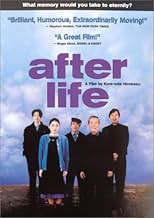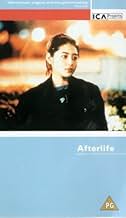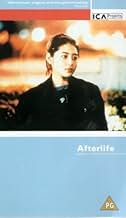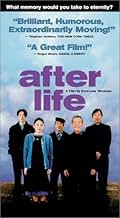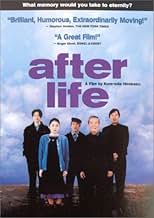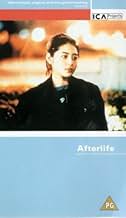IMDb रेटिंग
7.6/10
15 हज़ार
आपकी रेटिंग
मृत्यु के बाद, लोगों के पास एक सप्ताह है, केवल एक स्मृति को चुनने के लिए जिसे वो अनंत काल तक रख सके.मृत्यु के बाद, लोगों के पास एक सप्ताह है, केवल एक स्मृति को चुनने के लिए जिसे वो अनंत काल तक रख सके.मृत्यु के बाद, लोगों के पास एक सप्ताह है, केवल एक स्मृति को चुनने के लिए जिसे वो अनंत काल तक रख सके.
- पुरस्कार
- 7 जीत और कुल 8 नामांकन
Arata Iura
- Takashi Mochizuki, counselor
- (as Arata)
फ़ीचर्ड समीक्षाएं
9KFL
The Afterlife is best thought of as a kind of thought experiment, perhaps in the same vein as Groundhog Day. The point is not that this may be what we experience after death; it is rather that we need to think more about what it is in this life that we'd really like to keep with us forever.
This point needs emphasis. When asked what we want most in life, most of us will talk about our career, or a business venture perhaps, or some other accomplishment. This movie suggests that these kinds of things may not, at the end of the day, be so important as some other experiences we may have. In any case, it challenges us to rethink what it is we really value.
Some reviewers complain about the quite ordinary surroundings and "poor production values" of the movie. I prefer to think of the choice of sets etc as humble and realistic. Could any movie, whatever its budget, ever possibly do justice to this subject matter?
Much of this movie is devoted to explorations of the lives of a number of rather ordinary people, trying to identify their most cherished memories. Some reviewers have condemned The Afterlife as boring, boring, BORING on this account. It all depends on whether other people interest you. If all you want to see is car chases, sex, explosions, cool special effects,...avoid this movie. Only, it's worth noting that the lives and thoughts of others may help us to better understand ourselves. And nowhere more so than in this movie.
This point needs emphasis. When asked what we want most in life, most of us will talk about our career, or a business venture perhaps, or some other accomplishment. This movie suggests that these kinds of things may not, at the end of the day, be so important as some other experiences we may have. In any case, it challenges us to rethink what it is we really value.
Some reviewers complain about the quite ordinary surroundings and "poor production values" of the movie. I prefer to think of the choice of sets etc as humble and realistic. Could any movie, whatever its budget, ever possibly do justice to this subject matter?
Much of this movie is devoted to explorations of the lives of a number of rather ordinary people, trying to identify their most cherished memories. Some reviewers have condemned The Afterlife as boring, boring, BORING on this account. It all depends on whether other people interest you. If all you want to see is car chases, sex, explosions, cool special effects,...avoid this movie. Only, it's worth noting that the lives and thoughts of others may help us to better understand ourselves. And nowhere more so than in this movie.
Afterlife is without a doubt one of the greatest Japanese films I've ever seen. Visually it is truly stunning. Kore Eda is known for his own obsession with lighting and his skill for casting shadows and beams of white light are second to none. Combined with an innovative, creative and enjoyable story that takes on a slightly supernatural docu-drama and at the same time is set in a dull, down and out halfway house between Earth(life) and heaven(afterlife). Fascinating scenes take place as the deceased have one week to decide on a single memory from their lifetime that they can keep for all eternity. He also includes elements of documentary with talking head scenes of the deceased talking about their memories. Kore Eda throws around some extremely interesting ideas and themes on life and human emotions for our memories and he genuinely makes you think about what he's said once you've finished watching.
This is a film that not everyone would enjoy due to its slow moving pace, mood orientated lighting and partly improvised script, but it is a creative masterpiece that is definitely worthy of high praise and attention.
This is a film that not everyone would enjoy due to its slow moving pace, mood orientated lighting and partly improvised script, but it is a creative masterpiece that is definitely worthy of high praise and attention.
Afterlife is another film offering an answer to the unanswerable question "What happens after you die? ". Although this has been asked many times through cinema in the past, few films have answered as elegantly as Afterlife.
Directly after dying the departed are received by a group of counsellors who assist them in finding what was, for them, the most beautiful and perfect, single experience of their lives. For some the choice is easy and they are instantly able to provide the moment, which, once recreated by technicians, they remain in forever but the majority of the film concentrates upon those who are unable to find their perfect moment, and need extra help to recall past loves and lost days of their youth. The institution has the perfect means to assist this choice, with the complete life of everyone on grainy home-video, perhaps a comment on the tehcnology and recording-obsessed Japanese.
Many of the scenes are visually exceptional, especially those in the snow and everything seems very real, and, ironically, down-to-earth, especially the school building being used throughout the film giving an institutional feeling, but the interaction between the staff is where the film holds its true strength. Especially interesting is the relationship between Shiori, a newly employed worker, and Mochizuki, her mentor, which develops throughout. The film is slow to start due to the documentary style often used, but proceeds in an enveloping manner holding your attention to the end. Along with "Heaven can wait" and "Beetlejuice" this film offers another novel look at life, death and the hereafter.
The Japanese title was "Wandafuru raifu" (wonderful life, after Frank Capra) and, even though the film is dealing with death, it is a statement of how wonderful life is.
I loved this film and it stuck me stunningly and reminded me of how good films can be when they try.
Directly after dying the departed are received by a group of counsellors who assist them in finding what was, for them, the most beautiful and perfect, single experience of their lives. For some the choice is easy and they are instantly able to provide the moment, which, once recreated by technicians, they remain in forever but the majority of the film concentrates upon those who are unable to find their perfect moment, and need extra help to recall past loves and lost days of their youth. The institution has the perfect means to assist this choice, with the complete life of everyone on grainy home-video, perhaps a comment on the tehcnology and recording-obsessed Japanese.
Many of the scenes are visually exceptional, especially those in the snow and everything seems very real, and, ironically, down-to-earth, especially the school building being used throughout the film giving an institutional feeling, but the interaction between the staff is where the film holds its true strength. Especially interesting is the relationship between Shiori, a newly employed worker, and Mochizuki, her mentor, which develops throughout. The film is slow to start due to the documentary style often used, but proceeds in an enveloping manner holding your attention to the end. Along with "Heaven can wait" and "Beetlejuice" this film offers another novel look at life, death and the hereafter.
The Japanese title was "Wandafuru raifu" (wonderful life, after Frank Capra) and, even though the film is dealing with death, it is a statement of how wonderful life is.
I loved this film and it stuck me stunningly and reminded me of how good films can be when they try.
"When we come to the last moment of this lifetime and we look back across it, the only thing that's going to matter is 'What is the quality of our love?" - Richard Bach
One of the most commonly reported aspects of near-death experiences is the life review, the seeing and re-experiencing of major and trivial events of one's life, sometimes from the perspective of the other people involved. Most say that the single most important lesson they learned is that the actions we think are trivial and unimportant turn out to be the most important, especially ones that involve spontaneous acts of love. While not exactly a life review, in After Life by Hirokazu Koreeda, a group of recently deceased people are asked to look back at their life and choose only one memory from their life that they want to take with them to eternity. The process compels people to look at their life in its entirety and see what worked and what was missing.
Set in a dreary barracks-like way station, civil servants meet with those just crossed over to help them choose the experience they want to hold on to. For some, the choice is easy, for others it is difficult. Those that will not or cannot choose are consigned to work in the substation with the newly deceased until they are ready to move on. The counselors work one on one with each individual telling them that they have three days to make their choice. Once a memory is selected, a film crew recreates the memory-- sets are built and the little touches of sights and sounds are selected until the deceased are satisfied that they are witnessing a perfect recreation of their experience. It is that film that they take with them, not the original memory.
At first some choose things such as a trip to Disneyland, a sexual encounter, or a memorable bowl of rice but later gravitate toward experiences that are more meaningful. The center of the film revolves around those who are unable to choose. Ichiro Watanabe (Taketoshi Naito) is a 70-year old management consultant who has led an uneventful life and is challenged to find a memory he thinks is worth preserving for all time. To help him in this process, he is allowed to scan through piles of videotapes representing each year of his life. One young man wants to choose a dream instead of an actual event. Another wants to forget his past entirely, and an elderly woman is stuck in the mindset of a nine-year old girl.
After Life is the story of the caseworkers as well. Takashi Mochizuki (Arata) has been stuck in limbo because he cannot find any happiness in his twenty-two years until he realizes how his short life deeply affected someone else. His perfect realization also affects a co-worker Shiori (Erika Oda) who has fallen in love with him. After Life is a beautiful and touching film that allows us to reflect on the things that brought us joy in our own life, and to recognize that true happiness lies, not in outward symbols of success, but in giving ourselves to others.
One of the most commonly reported aspects of near-death experiences is the life review, the seeing and re-experiencing of major and trivial events of one's life, sometimes from the perspective of the other people involved. Most say that the single most important lesson they learned is that the actions we think are trivial and unimportant turn out to be the most important, especially ones that involve spontaneous acts of love. While not exactly a life review, in After Life by Hirokazu Koreeda, a group of recently deceased people are asked to look back at their life and choose only one memory from their life that they want to take with them to eternity. The process compels people to look at their life in its entirety and see what worked and what was missing.
Set in a dreary barracks-like way station, civil servants meet with those just crossed over to help them choose the experience they want to hold on to. For some, the choice is easy, for others it is difficult. Those that will not or cannot choose are consigned to work in the substation with the newly deceased until they are ready to move on. The counselors work one on one with each individual telling them that they have three days to make their choice. Once a memory is selected, a film crew recreates the memory-- sets are built and the little touches of sights and sounds are selected until the deceased are satisfied that they are witnessing a perfect recreation of their experience. It is that film that they take with them, not the original memory.
At first some choose things such as a trip to Disneyland, a sexual encounter, or a memorable bowl of rice but later gravitate toward experiences that are more meaningful. The center of the film revolves around those who are unable to choose. Ichiro Watanabe (Taketoshi Naito) is a 70-year old management consultant who has led an uneventful life and is challenged to find a memory he thinks is worth preserving for all time. To help him in this process, he is allowed to scan through piles of videotapes representing each year of his life. One young man wants to choose a dream instead of an actual event. Another wants to forget his past entirely, and an elderly woman is stuck in the mindset of a nine-year old girl.
After Life is the story of the caseworkers as well. Takashi Mochizuki (Arata) has been stuck in limbo because he cannot find any happiness in his twenty-two years until he realizes how his short life deeply affected someone else. His perfect realization also affects a co-worker Shiori (Erika Oda) who has fallen in love with him. After Life is a beautiful and touching film that allows us to reflect on the things that brought us joy in our own life, and to recognize that true happiness lies, not in outward symbols of success, but in giving ourselves to others.
I saw this movie in the theatre. It is always a pleasure to be at a viewing where there is spontaneous applause at the end. This is one of those movies. It speaks to your very soul. I understand that quite a few of the cast were not professional actors, but spoke from their own lifetime experiences. There is a very simple premise: you get to choose the most favourite moment of your life after you are dead and then help to recreate it, staging, cast of characters, scene - and the total non-professional manufacturing of this moment I found very touching - so that it can be savoured for all eternity. The perfect heaven. Of course some recently dead people can't think of anything, some remember very simple things, some are given assistance, like the record of their entire life in video form to review and extract a memory, if they can. The cast and direction is brilliant. I shudder to think of what modern Hollywood would do with this ("What dreams may come" being a case in point). It was all extremely simple and believable and has certainly had me talking about it for quite a while since I have seen it. 8 out of 10.
क्या आपको पता है
- ट्रिवियाMuch of the action in After Life is shown as interviews conducted with the recently deceased regarding their lives. Some of these interviews were scripted, but many were done impromptu, with real people (not actors) reminiscing about their own lives.
- भाव
Kenji Yamamoto, who wants to forget his past: Say I choose a memory, from when I was eight or ten years old. Then I'll only remember how I felt back then? I'll be able to forget everything else? Really? You can forget? Well, then that really is heaven.
टॉप पसंद
रेटिंग देने के लिए साइन-इन करें और वैयक्तिकृत सुझावों के लिए वॉचलिस्ट करें
- How long is After Life?Alexa द्वारा संचालित
विवरण
बॉक्स ऑफ़िस
- US और कनाडा में सकल
- $8,01,985
- US और कनाडा में पहले सप्ताह में कुल कमाई
- $11,791
- 16 मई 1999
- दुनिया भर में सकल
- $8,01,985
इस पेज में योगदान दें
किसी बदलाव का सुझाव दें या अनुपलब्ध कॉन्टेंट जोड़ें



